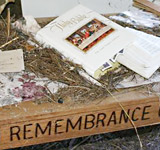Houston faith communities plan for future hurricanes
Posted: 9/01/06
Houston faith communities
plan for future hurricanes
By Karen Campbell
Union Baptist Association
HOUSTON—A conference on disaster preparedness—scheduled in 2005 but ironically postponed due to Hurricane Katrina—stressed the importance of planning ahead for hurricanes.
Interfaith Ministries sponsored the day-long event that drew more than 400 participants.
“As we found out during hurricanes Katrina and Rita last year, the faith community standing united is a tremendous asset during a time of crisis,” Houston Mayor Bill White said, noting conferences such as this one mean “we’ll all be better prepared to deal with the next storm, and the city is a proud partner in that.”
Other presenters echoed White’s sentiments.
| Bill King, who serves on the Governor’s Task Force on Evacuation, Transportation and Logistics, talks to a participant at the disaster planning meeting. |
“You saw in Houston a city who worked together,” noted Harris County Judge Robert Eckels, referring to the city’s response to Katrina and Rita. “Our faith was tested in the face of that tragedy. Our faith was strengthened as we provided hope. This year is a great year for preparation, because we’ve seen what can happen.”
Several speakers referenced Accu-Weather predictions for at least 17 named storms in 2006.
With 800,000 to 1 million people living in a surge zone area—what former Kemah Mayor Bill King described as “like a tsunami that batters for 12 hours”—the need for planning and preparation is critical.
King, who serves on the Governor’s Task Force on Evacuation, Transportation and Logistics, gave a firsthand account as one of the evacuees who experienced traffic snarls leaving Houston during the threat of Hurricane Rita.
King offered an overview of the recent report to the governor addressing evacuation plans and a comprehensive presentation on what faith groups can look for and do.
He reviewed four of the major recommendations in the report:
• Command and control.
Noting some smaller towns along evacuation routes refused to reconfigure their city stoplights, King suggested a need for a more streamlined approach to decision making. While the report went with a compromise of a unified regional 15-member council, King confessed the committee solution was not his first choice.
“I subscribe to the adage that ‘for God so loved the world, he did not send a committee,’” he quipped.
• Fueling.
The state has acquired the software to better manage fuel distribution with the industry, King reported.
“Just filling the tanks that are usually half filled during hurricane season” virtually solves the fuel shortages that emerged during evacuation, he said.
• Special needs.
King’s loudest call to the faith community came at the point of addressing the needs of the thousands who fall into the category of “anyone who cannot evacuate self.” Special-needs individuals can register by calling 211 and provide information for retrieval during evacuation. But King noted many are reluctant to provide such information in what they perceive as a government database.
• Traffic management.
King referenced Houston’s incident management as a potential model for the aggressive approach needed during evacuation.
“No matter how brilliant these recommendations, we are never going to be ready for a hurricane (level) five in this area,” King acknowledged, adding Houston can’t seem to evacuate “100,000 people from downtown on a Friday afternoon” without stalls. Evaluating the need for evacuation is one means for addressing the overcrowded routes.
Three risk factors should be considered in any decision about evacuation, he noted—whether a person lives in the surge zone, if the residence is susceptible to flooding and if a building is able to withstand sustained winds. A prolonged lack of utilities and special medical needs also are priority concerns, he added.
Evacuating for convenience—such as not wanting to be without air conditioning or having limited groceries—would fall into the category of those who might want to evacuate after the storm, King suggested.
For more information, see King’s detailed presentation at www.weking. net.
News of religion, faith, missions, Bible study and Christian ministry among Texas Baptist churches, in the BGCT, the Southern Baptist Convention ( SBC ) and around the world.

